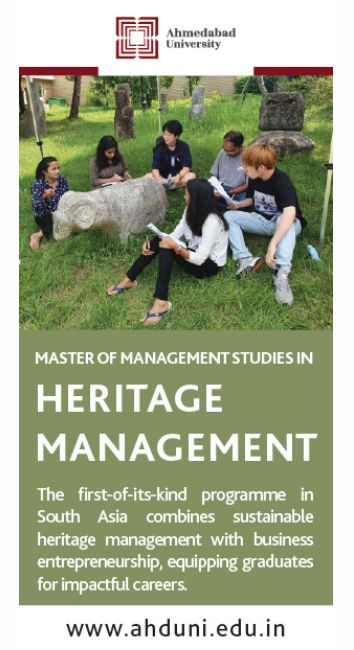Ahmedabad’s heritage has been a point of much discussion in recent years, partly due to the city receiving the UNESCO World Heritage City tag in 2017. Ahmedabad’s heritage has many dimensions representing both the tangible and intangible segments. On the World Heritage Day we explore the heritage aspects of Ahmedabad, through the lens of its industrial legacies: architecture, textile and art.
Architecture of Ahmedabad
Under the beginning of Ahmed Shah’s rule as Ahmedabad’s founder, there was a great deal of infrastructure that he put into place that still stands to this day. In Sultan Ahmed Shah’s architectural legacy we see a lot of intermingling of cultural expressions.
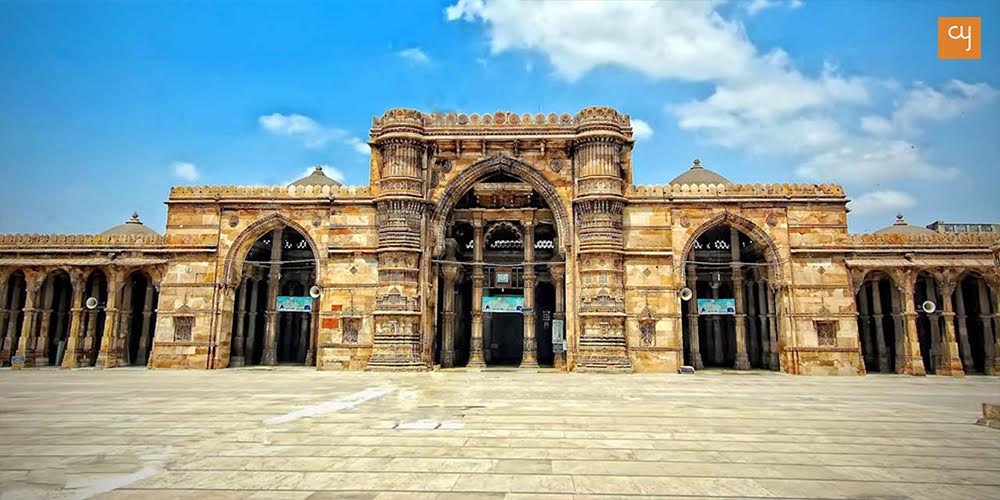
Today, if one wanders into the old city of Ahmedabad, one notices many time tinged mosques. Apart from the endearingly weathered stone, one will notice the Hindu motifs engraved in these stones. Many of these mosques, including the Jami Masjid, and the Juni Jami Masjid were built 6 centuries ago at the time the Sultan commissioned them, and they were built by the same artisans that were trained to build temples, who therefore applied the same skills for these mosques.
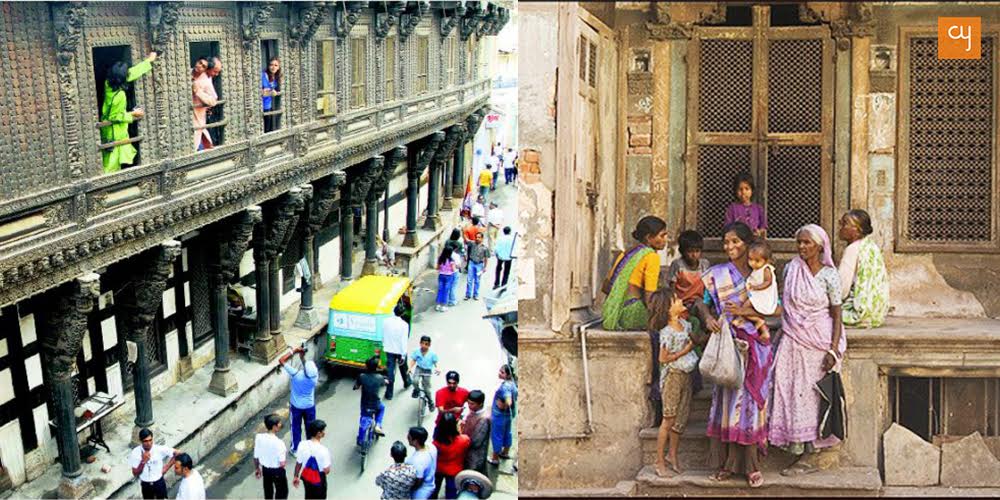
This theme of communities coming together continues even as we fast forward to the later years of Ahmedabad, to the characteristic pols, that make up most of the old city. Tight-knit communities designed with security in mind, these two to three-floor buildings are tightly packed into spaces and feature secret passageways and tiny lanes only locals can navigate. Then came the years where greats like Le Corbusier, BV Doshi, and Charles Correa made the city their stomping grounds, who brought works like Sabarmati Ashram Memorial Museum, and the Mill Owners’ Association Building, and CEPT University. The city and its architecture was recently in news around globe as BV Doshi was conferred the prestigious Pritzker Prize in Architecture for the year 2018.
Textile industry in Ahmedabad
This city’s past is inextricably linked with the industry of textile, beginning from the mid nineteenth century. The first mill was constructed in 1861 by Ranchhodlal Chhotalal and in the next 100 years, this mumber increased to a staggering 70 mills, and Ahmedabad came to be known as the Manchester of the East. Many business families contributed to this phenomenal growth. One of the illustrious names among these is of the Calico Mills, owned by the Sarabhai family. Sarabhai’s are instrumental is giving Ahmedabad one of the finest Textiles museums – the Calico Museum of Textiles. Founded in 1949 the museum showcases rare Textile weaves and also is involved in research and publication. Mahatma Gandhi, through his beloved charkha (hand spinning wheel) has also added to the Textile legacy. The institutes created by him for the purpose of popularising hand-spinning are still alive and continue to supply khadi to the markets.
Arts in Ahmedabad
Ahmedabad has been a significant source of artistic talent since generations. Among the popular names of 20th century M.F. Hussain is known to have found his muse in the city of Ahmedabad. Sheth CN College of Fine Arts founded by artist Rasiklal Parikh has been home to many artists over the past 4-5 decades. Ahmedabad is home to many world class institutes dedicated in the service of arts. LD Institute of Indology, Amdavad ni Gufa, Kanoria Centre of Arts, Hutheesing Centre are among the leading names. Recent additions to this legacy is the sprawling Kasturbhai Lalbhai Museum, created by the illustrious Lalbhai family of Ahmedabad. They manage various other art, cultural and academic institutions of the city. Recently Ahmedabad is witnessing an upsurge in art related activities, worth mentioning is the opening of 079 Stories which is a new feather in Ahmedabad’s cap. The place hosts visual arts and performing arts do’s and brings a fresh approach to the whole idea of creating engagement with arts.
Ahmedabad is also known for its folk art tradition. Some of the popular folk art that the city is known for are beadwork, kalamkari (fabric painting technique) and Mata ni Pachhedi (religious scrolls) . These art is passed down from generation to generation since more than 300 years. These finely drawn scenes are painted with a bamboo brush on a cloth and hung behind deities in temples.
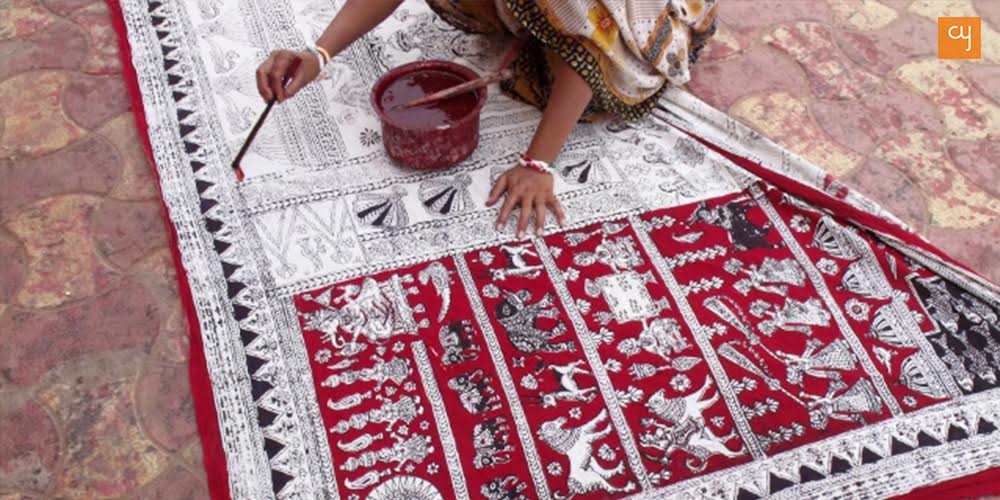
Whether in 1411 or 2019, combining business and aesthetics has been a running theme in Ahmedabad’s story. This Heritage Day, let us appreciate the generations of work that precede us and continue this legacy. At Creative Yatra we will be celebrating ‘aapnu amdavad’ during the entire week following Heritage Day. If you have interesting photos of heritage spots of Ahmedabad, do share with us, we will be happy to share them on our page.
Yatra Archives

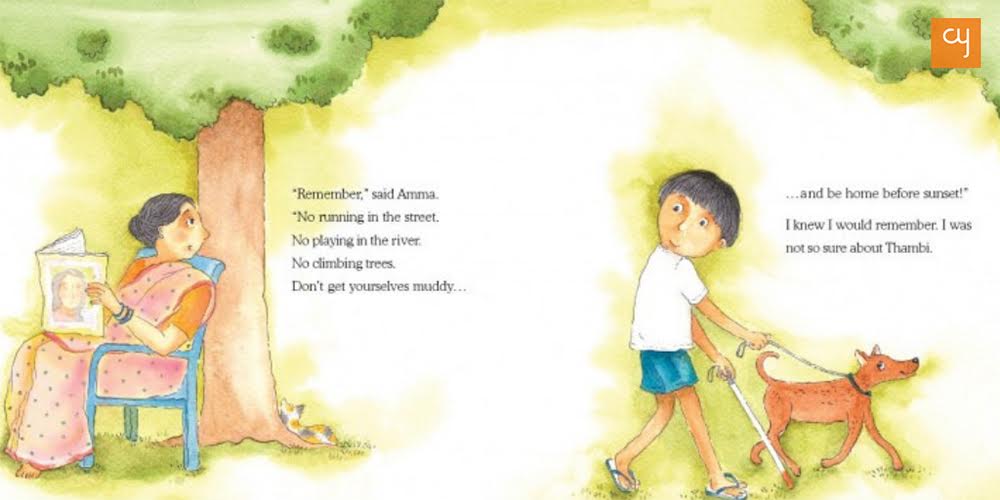 How Tulika Books is creating impact in children’s lives through picture books
Nandini Varma
How Tulika Books is creating impact in children’s lives through picture books
Nandini VarmaAug 21, 2019
A children’s book about a boy who feels like a girl. And about a child brought up by grandfathers. These are some of the stories published by Tulika Books, who have been making children’s picture books since 23 years. Little…
 Dalgona Coffee: A worldwide social media trend about home-made café experience
Harshil Shah
Dalgona Coffee: A worldwide social media trend about home-made café experience
Harshil ShahApr 2, 2020
While the lockdown has ignited various trends on social media, one that has received a major global following is #DalgonaCoffee. With thousands of posts on its name, here’s all you need to know about the Dalgona Coffee wave. I first…
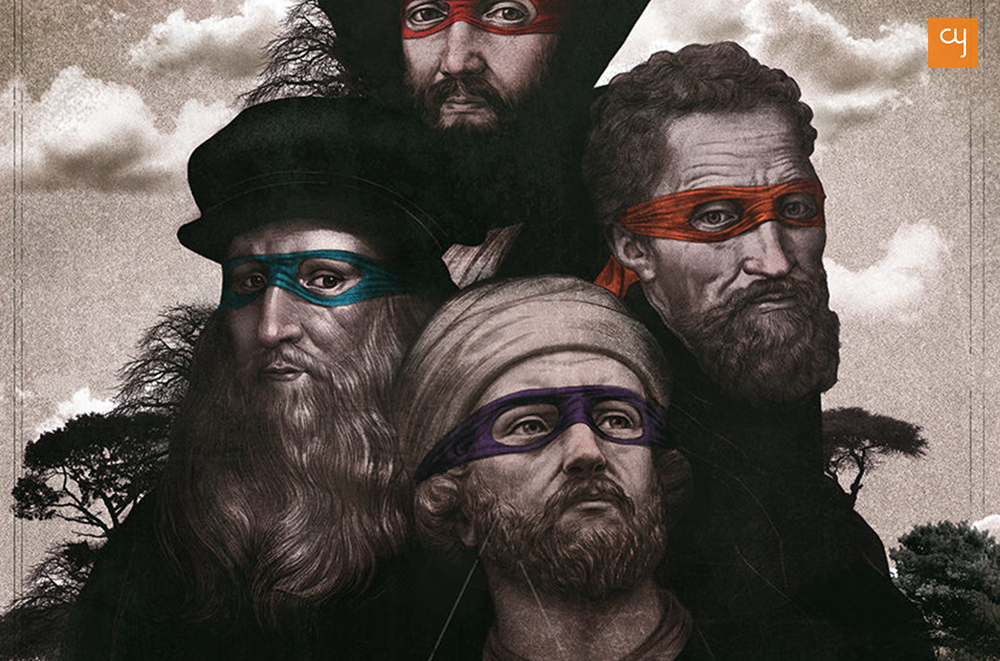 Leonardo, Michelangelo, Raphael and Donatello—Artists or Teenage Mutant Ninja Turtles characters?
Harshil Shah
Leonardo, Michelangelo, Raphael and Donatello—Artists or Teenage Mutant Ninja Turtles characters?
Harshil ShahNov 5, 2019
Did you ever wonder where the Teenage Mutant Ninja Turtles’ characters got their names from? Well, your search is complete. Here is a brief introduction of the artists from whom the creators of TMNT took inspiration. Teenage mutant ninja turtles,…
 The call of the mountains: orthopaedic Dr Yatin Desai’s advice on trekking
Himanshu Nainani
The call of the mountains: orthopaedic Dr Yatin Desai’s advice on trekking
Himanshu NainaniMay 24, 2019
In this piece 64 year old Dr Yatin Desai, shares with CY his inspiring story of how to scale towering mountains with utmost ease and how this life adventure activity can shape human character and health. Chances are high that…


